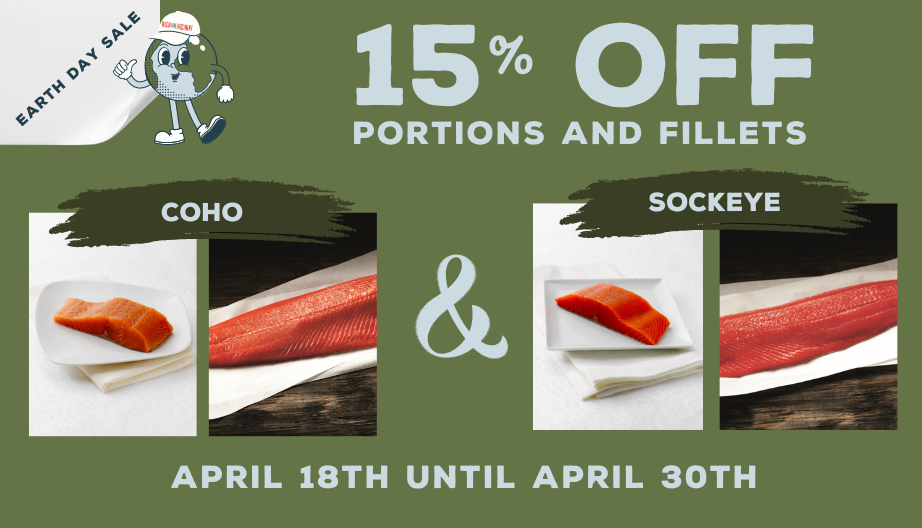Wild for Salmon cares about your health. So does Dr. Annie Fenn, with whom we recently spoke on the topic of brain health, particularly the prevention of Alzheimer’s, and the role of wild salmon in our diets. It was a privilege to learn from her and even more so to have the opportunity to share some of that wisdom with you!
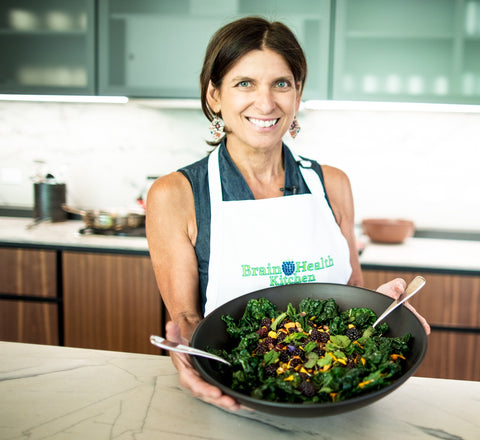
We asked this expert a few specific questions regarding her work, our favorite protein and brain health.
WFS: What are some common concerns from the students in your classes?
AF: Many students come to the cooking school motivated to learn which foods can reduce their risk of getting Alzheimer’s and other types of dementia. Most have been touched by Alzheimer’s in some way— by experiencing the disease with a parent, spouse, sibling, grandparent, or as a dementia caregiver. Other students have had traumatic brain injuries which puts them at increased risk for dementia later in life. And others have suffered from anxiety and depression, or another type of mental illness, and want to learn how eating better could help.
WFS: Your website states that you start working with clients by helping to improve their “food environment,” what’s the most common thing you help folks pull from their fridge, pantry and diet?
AF: Yes, that term was coined by a hero of mine, Dr. Marion Nestle. What she means is that we eat what surrounds us. I employ this concept often with clients, encouraging them to prepare a healthy food environment as a first step. And most often, it is unhealthy oils that we pull from the pantry. You really only need two oils for brain healthy cooking – avocado oil for high heat or neutral flavor and olive oil for everything else. There are many unhealthy oils on the market that are high in omega-6’s (not as good as omega-3s!) and saturated fats. I like to keep it simple and stick to just olive oil and avocado oil – or blend them together for recipes like roasting vegetables. I am also a fan of pecan oil, if you can find it. It is good for high-heat cooking and is rich in polyunsaturated fats and antioxidants.
We have our own reasons for encouraging our customers to eat wild salmon instead of farmed (as explained here). We knew Annie was making the wild choice as well, but we wanted to know what her reasoning was, as a physician.
WFS: Why is it important, in terms of brain health, to eat wild salmon rather than farmed?
AF: Both farmed and wild salmon are lean sources of protein and a good source of omega-3 fatty acids. But wild salmon has more of the types of fats we consider brain-healthy. There are studies that link a diet high in saturated fats with an increased risk of Alzheimer’s. Farmed salmon is higher in saturated fat, inflammatory omega-6 fatty acids, and calories, than wild salmon. That’s because farmed fish are fed a diet of processed food that is high in fat in order to grow bigger fish. Wild salmon is composed of the more brain-friendly mono- and polyunsaturated fats. Wild salmon is also a lot less likely to contain environmental toxins. Farmed salmon harbors more organochlorine compounds, such as PCBs, dioxins, and chlorinated pesticides.
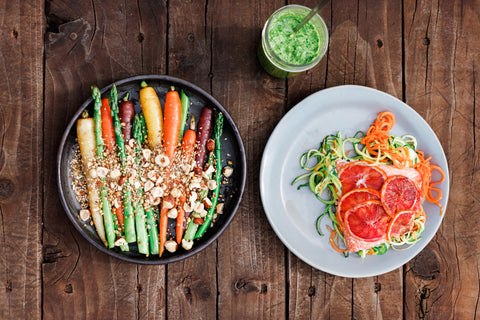
Last month, we wrote a blog about which cooking methods are considered the healthiest. This was another instance where we wanted to hear the answer from Annie’s perspective.
WFS: Can you elaborate a bit more on cooking processes (for salmon) and why they are important in this context?
AF: It is very important to cook salmon gently to protect its beneficial fats and nutrients. Wild-caught salmon’s fat profile comes from mostly mono- and polyunsaturated fats. These break down when high heat is applied. The vitamin D content of salmon also goes down with high heat cooking methods. I advise braising, steaming, poaching, smoking, slow-roasting, and grilling over indirect heat. It’s fine to cook your salmon in a frying pan, just use a low heat and add water and olive oil so that it is poaching and not searing.
Sometimes it’s hard to know which actions lead to which results, and even more common is feeling overwhelmed or discouraged by each new health report. We wanted to check with Annie about making changes in our diet and lifestyles and how effective that can be.
WFS: We know diet impacts brain health. However, if you change your diet late in life, will it still have a positive impact on reducing the risks of diseases like dementia?
AF: Yes, studies point to an improvement in brain health with a brain-friendly diet, even in older age groups. We now have MRI data that shows brain volume goes up within three years of adopting a Mediterranean diet*! More brain volume means more neurons, more synapses, more collateral neural pathways — all findings associated with a lower risk of Alzheimer’s. Those who adhered more closely to a Mediterranean-type diet had greater brain volume and less of the amyloid plaque typically seen in Alzheimer’s on MRI.
There is still so much to learn about these complex conditions, but we were encouraged by this answer and hope you are too. *The Mayo Clinic defines the Mediterranean diet as “a way of eating based on the traditional cuisine of countries bordering the Mediterranean Sea […] typically high in vegetables, fruits, whole grains, beans, nuts and seeds, and olive oil.” And fish! The Clinic includes that “fish are also important in the Mediterranean diet” especially ones high in Omega-3s. You can read more about it here. As we shared in a blog last May, this style of eating has also shown to positively support our mental health.
And, of course, we wanted to talk recipes!
WFS: What is your favorite salmon recipe? Quickest?
AF: My current favorite way to prepare salmon is by slow-roasting it in the oven. While the oven preheats to 300ºF, I’ll scatter sliced fennel bulbs or onions on a rimmed baking sheet. I place a side of salmon, skin side down, on top of the vegetables and rub it with olive oil and salt. While it roasts in the oven (for about 25 to 35 minutes), I’ll make a quick Green Tahini sauce in a blender: tahini, parsley, lemon juice, salt and a small clove of garlic. When the salmon is done, I scatter the fennel fronds over the top and drizzle it with the tahini sauce. And, my quickest salmon recipe involves poaching a filet of salmon in a shallow pan with a small amount of olive oil and white wine.
This interview has been edited for brevity & clarity. The above photos provided by Brain Health Kitchen.
Try out one of her recipes: Citrusy Salmon Packets with Zoodles and Cilantro Chutney!


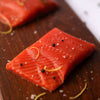 Wild Alaska Salmon
Wild Alaska Salmon Alaska Salmon Burgers
Alaska Salmon Burgers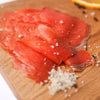 Smoked Salmon & Seafood
Smoked Salmon & Seafood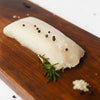 Wild Alaska Whitefish
Wild Alaska Whitefish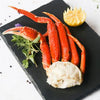 Wild Shellfish & Shrimp
Wild Shellfish & Shrimp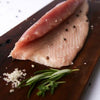 Wild Albacore Tuna
Wild Albacore Tuna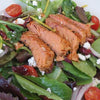 Canned Seafood
Canned Seafood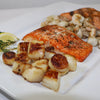 Meal Box & Samplers
Meal Box & Samplers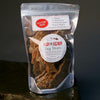 Pet Products
Pet Products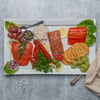 Gifts
Gifts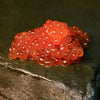 Specialty
Specialty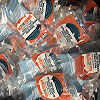 Wholesale Ordering
Wholesale Ordering